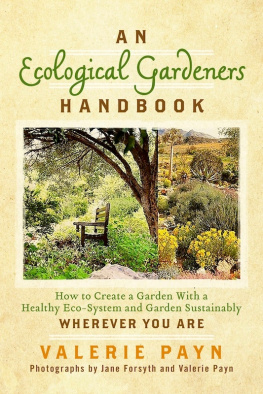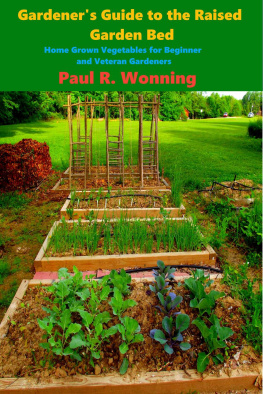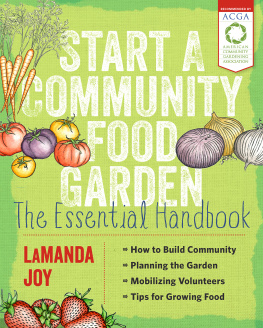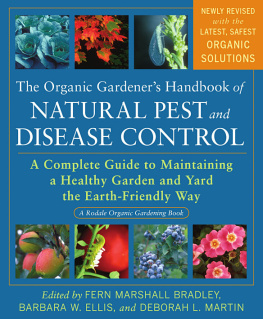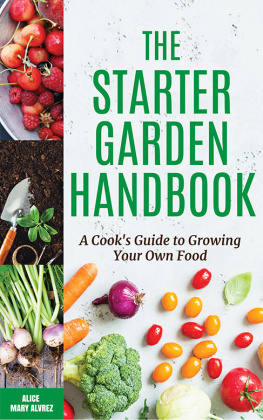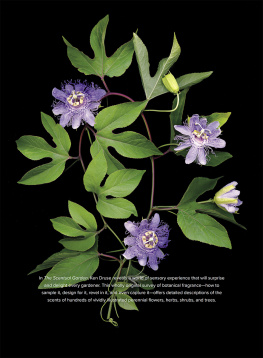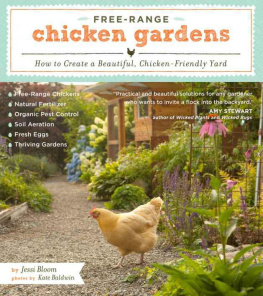Payn - An ecological gardeners handbook. How to Create a Garden With a Healthy Eco-System and Garden Sustainably
Here you can read online Payn - An ecological gardeners handbook. How to Create a Garden With a Healthy Eco-System and Garden Sustainably full text of the book (entire story) in english for free. Download pdf and epub, get meaning, cover and reviews about this ebook. City: United States, year: 2015, publisher: BookBaby, genre: Religion. Description of the work, (preface) as well as reviews are available. Best literature library LitArk.com created for fans of good reading and offers a wide selection of genres:
Romance novel
Science fiction
Adventure
Detective
Science
History
Home and family
Prose
Art
Politics
Computer
Non-fiction
Religion
Business
Children
Humor
Choose a favorite category and find really read worthwhile books. Enjoy immersion in the world of imagination, feel the emotions of the characters or learn something new for yourself, make an fascinating discovery.
An ecological gardeners handbook. How to Create a Garden With a Healthy Eco-System and Garden Sustainably: summary, description and annotation
We offer to read an annotation, description, summary or preface (depends on what the author of the book "An ecological gardeners handbook. How to Create a Garden With a Healthy Eco-System and Garden Sustainably" wrote himself). If you haven't found the necessary information about the book — write in the comments, we will try to find it.
Payn: author's other books
Who wrote An ecological gardeners handbook. How to Create a Garden With a Healthy Eco-System and Garden Sustainably? Find out the surname, the name of the author of the book and a list of all author's works by series.
An ecological gardeners handbook. How to Create a Garden With a Healthy Eco-System and Garden Sustainably — read online for free the complete book (whole text) full work
Below is the text of the book, divided by pages. System saving the place of the last page read, allows you to conveniently read the book "An ecological gardeners handbook. How to Create a Garden With a Healthy Eco-System and Garden Sustainably" online for free, without having to search again every time where you left off. Put a bookmark, and you can go to the page where you finished reading at any time.
Font size:
Interval:
Bookmark:

ISBN: 9781483555409
About the Author
I have been a very keen gardener for most of my adult life, a passion inherited from my mother. After completing a garden design course through renowned British landscaper David Stevens International Garden Design School in the early 1990s, I practiced for many years as a professional landscape designer and consultant, wrote regular articles for a popular South African gardening magazine, and ran workshops on garden design for aspiring gardeners.
In 2008 I returned to university to read for an Mphil. Degree in Sustainable Development Planning and Management. There I was inspired by what I learnt about ecological design, organic agriculture, permaculture, and the connections between our actions and the state of the environment. I decided there was a gap in the market for a gardening book that explains the close connections between plants, living creatures and conditions in the environment, and how we can use these connections to create vibrant, healthy garden eco-systems.
I have written this book with hope. Yes, I really believe eco-friendly gardening can help to save Earth from some of our environmentally destructive ways. Imagine a future where roofs, balconies, parks, pavements, walls, wastelands and gardens, in every town and city, become life regenerating, resource creating, productive, mini-conservancies. In that world, the expression urban jungle might take on a different meaning. I hope this book will contribute in a small way towards fulfilling that vision.
As you read this book, I hope you will become as excited as I have been at discovering that, when you learn to work with Nature, magic begins to happen and Life starts to create more Life.
Happy Gardening!
Acknowledgements
In many ways a book like this is a communal project. It relies on information and assistance from a broad community of people, with a diverse range of interests. With thanks to all who have helped, in big and small ways, with this project.
Thanks especially to the following who, variously, welcomed me into their gardens, shared their gardening experiences, let me take photographs, assisted with professional knowledge, provided contacts and articles, or offered support, encouragement and constructive criticism.
Special thanks to Joy Nightingale and Gloria Kjonstad for their editing, and Jane Forsythe for letting me use some of her beautiful photographs.
Thanks to Professor Michael Samways, Dr. Gareth Haysom, Professor Anton Pauw, Walle Menne, Johan ORiaan, Dr.Alice Ashwell, Elma Pollard, Kevin and Fiona Record, Guy and Di Smith, Neil Major, staff at South African National Botanical Institute, especially Carol Poole, community gardeners of Orangezicht, Kate Davies, native plant gardeners of Cotswold Downs.
Photographs were taken at the following places:- South Africa - Solms Delta Wine Estate; Babylonstoren; Goegap Nature Reserve; Kirstenbosch National Botanical Garden; Durban Botanical Garden; Johans Borman Fine Art Gallery, Cape Town; Burnside Farm, Harding; Cotswold Downs, Hillcrest; Ashwell garden, Cape Town; 1 Old Tom Morris Lane, Pietermaritzburg. Swakopmund in Namibia. Kasbah Erg Chebbi and The Marjorelle Garden in Morocco.
Last, but certainly not least, special thanks to my family, Guy, Richard, Thomas and Alistair for tolerating my long obsession with gardens, and with this book.
Dedicated to my mother, Joan Bastard
Introduction
The Life Keeper
I built myself a garden wild, selfishly for mine own pleasure,
A sanctuary of scent and sight and sound
Where-in my frazzled soul could wander head high
intoxicated with blossom sweet scented blooming buds
to riot amongst a feast of form, and sing a song of all seasons delight.
Then tucked deep within the branches of my tree I found a nest
and realized the garden I had built to satisfy my soulful longing
had grown. All of its own acquired a will
and become for others a God created world of sustenance
and of Life, I had become a Keeper.
(Val Payn. 2003)

the future of mankind can be assured only if we rediscover ways in which to live as a part of nature, not apart from her HRH The Prince of Walesi addressing UN climate conference COP15, Copenhagen (December 2009).
For millions of years plants flourished on Earth with no help whatsoever from human beings. Where ever there was enough sunlight, warmth and water, plants grew all by themselves with not a person in sight. Then along came some bright, hard working, plant loving people who decided plants could not possibly survive without plenty of dedicated human help. The gardening industry was born.
Gardens, of course, have brought many delightful pleasures to people through the ages. They beautify our surroundings, are places to relax, socialize, enjoy the outdoors, commune with Nature, be creative, uplift our spirits, and of course grow all sorts of useful, interesting and attractive plants.
Today the gardening industry is worth a fortune. Countless gardening magazines, T.V programmes, adverts and garden stores encourage us to create gardens full of highly bred, exotic plants from all corners of the world. To get these to grow we often irrigate heavily, use lots of chemical fertilizers, and spray toxic pesticides around like air freshener to keep all the bugs at bay just in case something dares attack our precious plants.
In the United States of America gardeners spend on average $35 billion on 90 million pounds of pesticides each year. In fact, American gardeners use more pesticides, herbicides and chemical fertilizers per acre of land than any other industry, including commercial agriculture (U.S. Environmental Protection Agency (EPA).2004). Many of these chemicals cause serious environmental problems. Some have also been linked to a range of human health problems, including cancer, birth defects, infertility, allergies, and liver and kidney problems (Repetto, R., et al. 1996. Rudel, Ruthann, et al, 2003. Lewis, R., et al. 1991).
The good citizens of the USA are not the only ones on Earth guilty of this complete chemical garden overdose. In my part of the world in Southern Africa, visit any garden centre or outdoor store, and one will likely find rows and rows of shelves groaning under the weight of chemical fertilizers, pesticides, herbicides and all sorts of other cides promising quick-fix solutions to any gardening problem. Sometimes there seem to be even more cides than plants for sale. There must be plenty of customers, otherwise why would the stores bother to stock all those toxins?
Gardening that relies on chemicals and heavy irrigation is expensive and time consuming. It causes pollution, wastes water and energy, damages the soil, and often changes the natural environment so much that local native plants and wildlife battle to survive. In short, this sort of gardening is an ideal way to create a pretty lifeless, drug addicted yard. One could say gardening with cides is the equivalent of environmental suicide!
And how on Earth, a skeptic might well ask, do wild plants ever manage to grow and thrive, all alone, without all this dedicated and expensive chemically based human help? And if wild plants can do it, why cant garden plants?
This book will tell you how Nature gets plants to grow. It will reveal the hidden natural processes that enable wild plants to thrive without any human help. And it will explain how we can use these same natural processes to create ecologically well adjusted gardens that support healthy plant life without using tonnes of chemicals.
Next pageFont size:
Interval:
Bookmark:
Similar books «An ecological gardeners handbook. How to Create a Garden With a Healthy Eco-System and Garden Sustainably»
Look at similar books to An ecological gardeners handbook. How to Create a Garden With a Healthy Eco-System and Garden Sustainably. We have selected literature similar in name and meaning in the hope of providing readers with more options to find new, interesting, not yet read works.
Discussion, reviews of the book An ecological gardeners handbook. How to Create a Garden With a Healthy Eco-System and Garden Sustainably and just readers' own opinions. Leave your comments, write what you think about the work, its meaning or the main characters. Specify what exactly you liked and what you didn't like, and why you think so.

